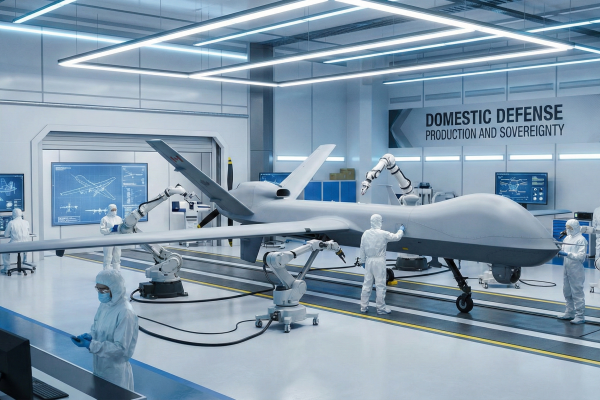December 1st, 2021 | 12:49 CET
Battle for market leadership - SAP, BrainChip Holdings, MicroStrategy
The future is becoming more digital and is taking over almost every area of our lives at an ever-faster pace. Whether blockchains and digital money, smart homes or robotics, the development possibilities are practically endless and the potential gigantic. To achieve visionary goals, a new generation of semiconductors is needed: Chips for artificial intelligence. For this area, the market research institute Gartner estimates a volume of around USD 43 billion for the coming year and growth to almost USD 73 billion by 2025. The battle for the top spot is in full swing.
time to read: 3 minutes
|
Author:
Stefan Feulner
ISIN:
SAP SE O.N. | DE0007164600 , BRAINCHIP HOLDINGS LTD | AU000000BRN8 , MICROSTRATEG.A NEW DL-001 | US5949724083
Table of contents:
Author
Stefan Feulner
The native Franconian has more than 20 years of stock exchange experience and a broadly diversified network.
He is passionate about analyzing a wide variety of business models and investigating new trends.
Tag cloud
Shares cloud
Fiercely competitive market
As always, in a rapidly growing market, many smaller companies are scrambling to make a breakthrough in developing artificial intelligence chips. In most cases, however, these lack the financial resources to become successful on their own. On the other hand, big companies like AMD or Intel lack the time and know-how to do detailed work and develop highly efficient semiconductors. Accordingly, the chip giants are buying up, taking over the smaller start-ups and securing their technological edge in this way. In 2019, Intel acquired the Israeli developer of programmable deep-learning accelerators for the data center Habana Labs for USD 2 billion.
Analysts at Pitt Street Research take this acquisition as a peer group comparison and therefore see a fair value of AUD 1.50, equivalent to EUR 0.94, for the share of BrainChip Holdings. The Company's current share price is EUR 0.37, equating to a market value of EUR 660.74 million. According to BrainChip CEO Ken Scarince, the analysts' comparison is even weak, as his Company is developing "the most efficient AI solution ever produced" with the Akida chip. The Australian Company is, after all, the world's first commercial manufacturer of neuromorphic AI chips.
BrainChip product with distinct advantages
The Akida chip requires much less power than well-known CPUs, with savings of up to 50% possible. The reason for this is the constant communication of the "normal" chips with the computer centers. In contrast, the revolutionary semiconductor from BrainChip works based on impulses and events, functions completely autonomously, and processes so-called spikes instead of traditional computer data. With each transaction, Akida learns independently through artificial intelligence. The technology is thus ideally suited for modern edge devices and is expected to find use in autonomous driving, IoT devices, robotics, medical diagnostics or security technology.
Sample development was done with SocioNext, a leader in application-specific integrated circuits. Production of the first generation took place at world market leader Taiwan Semiconductor.
A milestone in the Company's history
A partnership has been announced with MegaChips, a multi-billion dollar Japanese semiconductor company, to develop next-generation edge-based AI solutions. "The partnership of MegaChips and BrainChip furthers both companies' efforts to push boundaries and deliver unprecedented products," commented Rob Telson, VP of Worldwide Sales and Marketing at BrainChip. "By delivering Akida's on-chip learning and ultra-low power edge AI capabilities as an integrated technology in MegaChips' ASIC solutions, we can offer a range of benefits for state-of-the-art products that not only ensure energy efficiency without compromising results but can also run autonomously for increasing learning without the need for back-and-forth to the cloud."
Everything on the cloud
SAP and the cloud. What led to a sharp slide in the share price last year due to weak figures from the cloud segment is now set to become the focus of the software giant SAP in the future. According to an interview with Handelsblatt, SAP CEO Christian Klein wants to attack this promising division fully.
In the opinion of the CEO, the Walldorf-based Company is undervalued in contrast to its competitors: "If the same standards were applied to our cloud business as to our competitors, we would have almost reached our current market capitalization. And in the traditional business, we have a huge customer base. In addition, unlike many of our competitors, we still have a margin of almost 30%."
From a chart perspective, there is currently little interest in investing in the SAP share. After reaching a one-year high at EUR 128.54 and closing the torn downside gap on the occasion of the disappointing figures for the third quarter of 2020, the share price is marching back towards the breakout level at EUR 112.00. Should this be sustainably confirmed, an entry would be conceivable.
Bitcoin or nothing
Michael Saylor, the CEO of software maker MicroStrategy by profession, has struck again. One of the best-known Bitcoin bulls continues to digitize his managed Company's corporate money blithely. According to Sailor, the recent setbacks in bitcoin are a dip that should quickly turn upward.
As befits a modern crypto manager, he announced the acquisition via a tweet. Another 7,002 BTCs for about USD 414.4 million were bought in the past few days at an average price of USD 59,187. In total, MicroStrategy thus owns 121,044 BTC, with a purchase price of around USD 29,534 per BTC, making it the Company with the highest cryptocurrency holdings worldwide.
Innovative technologies require an enormous amount of memory on the one hand, and on the other hand, they have a high power consumption. BrainChip Holding has developed a revolutionary AI chip that should enjoy high demand in the future. SAP is fully committed to the cloud, and MicroStrategy currently sees a favorable entry opportunity in Bitcoin.
Conflict of interest
Pursuant to §85 of the German Securities Trading Act (WpHG), we point out that Apaton Finance GmbH as well as partners, authors or employees of Apaton Finance GmbH (hereinafter referred to as "Relevant Persons") may in the future hold shares or other financial instruments of the mentioned companies or will bet on rising or falling on rising or falling prices and therefore a conflict of interest may arise in the future. conflict of interest may arise in the future. The Relevant Persons reserve the shares or other financial instruments of the company at any time (hereinafter referred to as the company at any time (hereinafter referred to as a "Transaction"). "Transaction"). Transactions may under certain circumstances influence the respective price of the shares or other financial instruments of the of the Company.
Furthermore, Apaton Finance GmbH reserves the right to enter into future relationships with the company or with third parties in relation to reports on the company. with regard to reports on the company, which are published within the scope of the Apaton Finance GmbH as well as in the social media, on partner sites or in e-mails, on partner sites or in e-mails. The above references to existing conflicts of interest apply apply to all types and forms of publication used by Apaton Finance GmbH uses for publications on companies.
Risk notice
Apaton Finance GmbH offers editors, agencies and companies the opportunity to publish commentaries, interviews, summaries, news and etc. on news.financial. These contents serve information for readers and does not constitute a call to action or recommendations, neither explicitly nor implicitly. implicitly, they are to be understood as an assurance of possible price be understood. The contents do not replace individual professional investment advice and do not constitute an offer to sell the share(s) offer to sell the share(s) or other financial instrument(s) in question, nor is it an nor an invitation to buy or sell such.
The content is expressly not a financial analysis, but rather financial analysis, but rather journalistic or advertising texts. Readers or users who make investment decisions or carry out transactions on the basis decisions or transactions on the basis of the information provided here act completely at their own risk. There is no contractual relationship between between Apaton Finance GmbH and its readers or the users of its offers. users of its offers, as our information only refers to the company and not to the company, but not to the investment decision of the reader or user. or user.
The acquisition of financial instruments entails high risks that can lead to the total loss of the capital invested. The information published by Apaton Finance GmbH and its authors are based on careful research on careful research, nevertheless no liability for financial losses financial losses or a content guarantee for topicality, correctness, adequacy and completeness of the contents offered here. contents offered here. Please also note our Terms of use.




